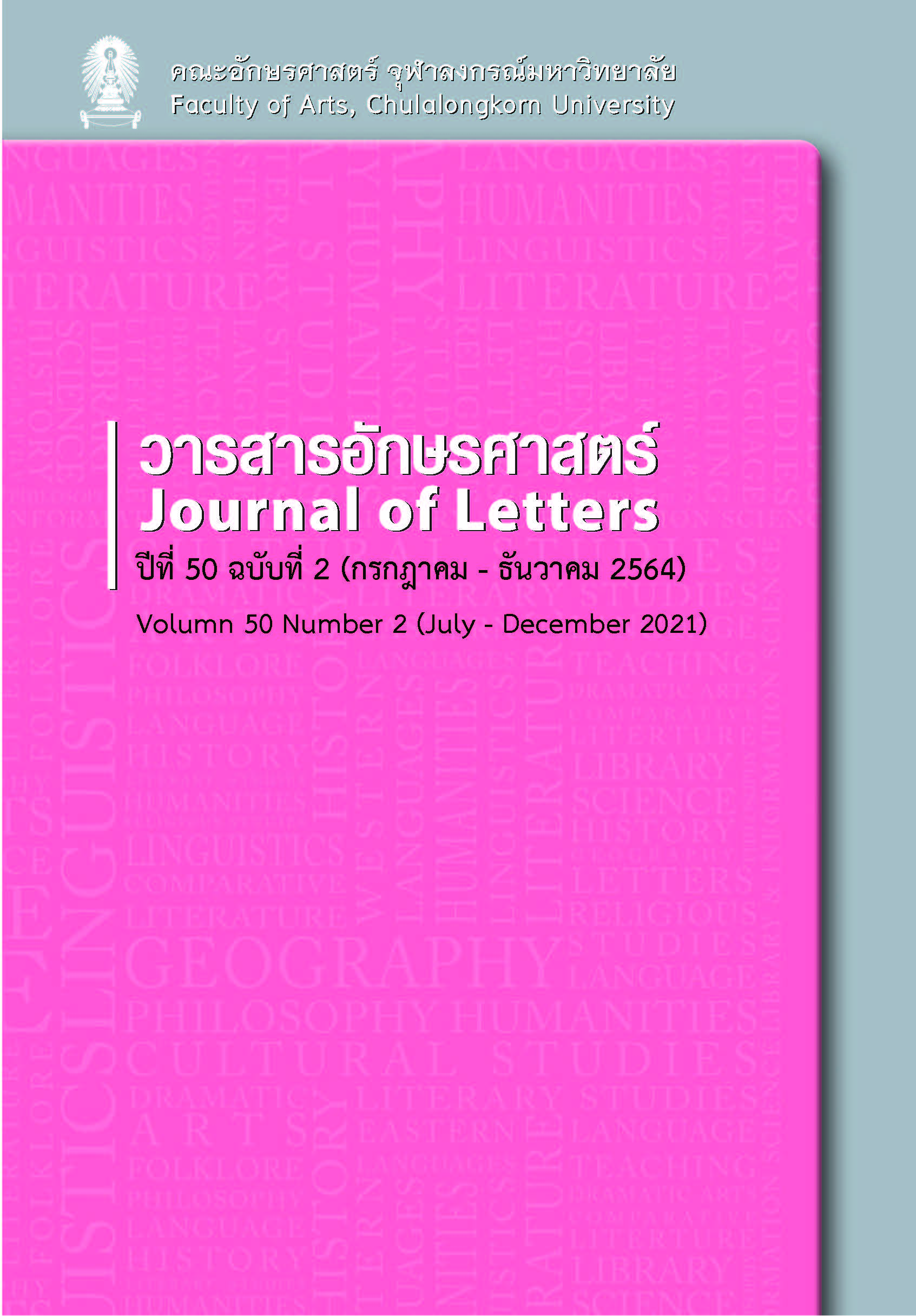The Use of First- and Second-Person Pronouns in German
Keywords:
first-person pronoun, second-person pronoun, address pronoun, criteria for address pronoun usage, du/Sie (T/V) distinction in GermanAbstract
First- and second-person pronouns are important for effective communication in many languages including German. Thus, learners and users of German as a foreign language have to be capable of using these address pronouns appropriately in various contexts and situations. This paper explores the usage of these pronouns in various contexts and with various meanings, arguing that there are many factors determining the use of these pronouns, especially du and Sie in contemporary German, such as age, social status, relationship between interlocutors and context of use. Therefore, in order to select appropriate address pronouns, learners and users of German need to possess sociopragmatic competence in addition to grammatical competence.
References
ภาษาไทย
Kittinata Rhekhalilit กิตตินาถ เรขาลิลิต. 2016. Kan chamnaek khwam taektang rawang sapphanam nuai sapphanam lae kham ang-ing tam naeokhit thang wakkayasamphan การจำแนกความแตกต่างระหว่างสรรพนาม หน่วยสรรพนาม และคำอ้างอิง ตามแนวคิดทางวากยสัมพันธ์ [The Differentiation of Pronouns, Pronominals and Terms of Reference in Different Syntactic Approaches. warasan manutsayasat วารสารมนุษยศาสตร์ [Humanities Journal] 23(1): 1-21.
Vipas Pothipath วิภาส โพธิแพทย์. 2019. Phasa Thai nai mummong baeplak phasa ภาษาไทยในมุมมองแบบลักษณ์ภาษา. [Typological Perspectives on Thai] (2nd ed.). Bangkok: Research and publication division, Faculty of Arts, Chulalongkorn University.
Wilita Sriuranpong วิลิตา ศรีอุฬารพงศ์. 2020. Watchanalila dan bukkhon samphan lae konlawithi thang phasa nai botkhwam khong warasan wichakan Yoeraman lae Thai dan phasa lae wannakhadi วัจนลีลาด้านบุคคลสัมพันธ์และกลวิธีทางภาษาในบทความของวารสารวิชาการเยอรมันและไทยด้านภาษาและวรรณคดี [Interpersonal Styles and Linguistic Strategies in Articles in German and Thai Academic Journals of Language and Litrature]. manutsayasat san มนุษยศาสตร์สาร [Journal of Human Sciences] 21(3): 128-151.
ภาษาต่างประเทศ
Adamzik, Kirsten. 2004. Sprache. Wege zum Verstehen (2nd ed.). Tübingen, Basel: A. Francke.
Boettcher, Wolfgang. 2009. Grammatik verstehen Vol. 1: Wort. Berlin: Walter de Gruyter.
Brown, R., & Gilbert, A. 1960. The Pronouns of Power and Solidarity. In Style in Language, ed. Thomas Sebeok, 253-276. Cambridge, Massachusetts: MIT Press.
Clyne, M., Norrby, C., & Warren, J. 2009. Language and Human Relations: Style of Address in Contemporary Languages. Cambridge: Cambridge University Press.
Clyne, Michael. 2009. Address in Intercultural Communication across Languages. Intercultural Pragmatics 6(3): 395-409.
Ernst, Peter. (2004). Germanistische Sprachwissenschaft. Wien: Facultas.
Glück, Helmut (Ed.). 2005. Metzler Lexikon Sprache (3rd ed.). Stuttgart: Metzler.
Hentschel, E., & Weydt, H. 2003. Handbuch der deutschen Grammatik (3rd ed.). Berlin: Walter de Gruyter.
Hoffmann, Ludger. 2016. Deutsche Grammatik. Grundlagen der Lehrerausbildung, Schule, Deutsch als Zweitsprache und Deutsch als Fremdsprache (3rd ed.). Berlin: Erich Schmidt.
Kresta, Ronald. 1995. Realisierungsformen der Interpersonalität in vier linguistischen Fachtextsorten des Englischen und des Deutschen. Frankfurt: Peter Lang.
Löbbers, Heinrich M. 2016. Wer sind wir? https://www.saechsische.de/wer-sind-wir-3438519.html, accessed June 20, 2021.
Simon, Horst J.. 2003. Für eine grammatische Kategorie ›Respekt‹ im Deutschen: Synchronie, Diachronie und Typologie der deutschen Anredepronomina. Tübingen: Max Niemeyer.
Simon, Horst. 2007. Wie Höflichkeit die Person(en) verwirrt- und wie’s die Grammatik wieder ordnet. In Der Ausdruck der Person im Deutschen, Irmtraud Behr, Anne Larrory, and Gunhild Samson, eds., 57-72. Tübingen: Stauffenburg,
Spahn, Jens. 2021. „Wir müssen Geduld haben. Wenn wir zu früh öffnen, riskieren wir schnell steigende Infektionszahlen.“ https://www.bundesgesundheitsministerium.de/presse/interviews/interviews/faz-310121.html, accessed April 9, 2021.
Wöllstein, Angelika et al. (Eds.). 2016. Duden. Die Grammatik (9th ed.). Berlin: Duden Verlag.
Zifonun, Gisela et al. 1997. Grammatik der deutschen Sprache (Vol. 1). Berlin: Walter de Gruyter.
Downloads
Published
How to Cite
Issue
Section
License
Copyright and plagiarism
Authors are responsible for obtaining permission to use copyrighted materials from copyright owners. Authors are responsible for observing requisite copyright law when quoting or reproducing copyrighted materials. Quotations and reproductions of content from other published sources must be accompanied by a reference and all sources should be clearly listed in the references section. Quotations and reproductions of content from external sources without due attribution could be considered a severe infringement of academic conduct and may constitute a legal offence under the Copyright Act of B.E. 2537. Any legal ramifications arising from the infringement of copyright regulations would be the sole responsibility of the author(s).



